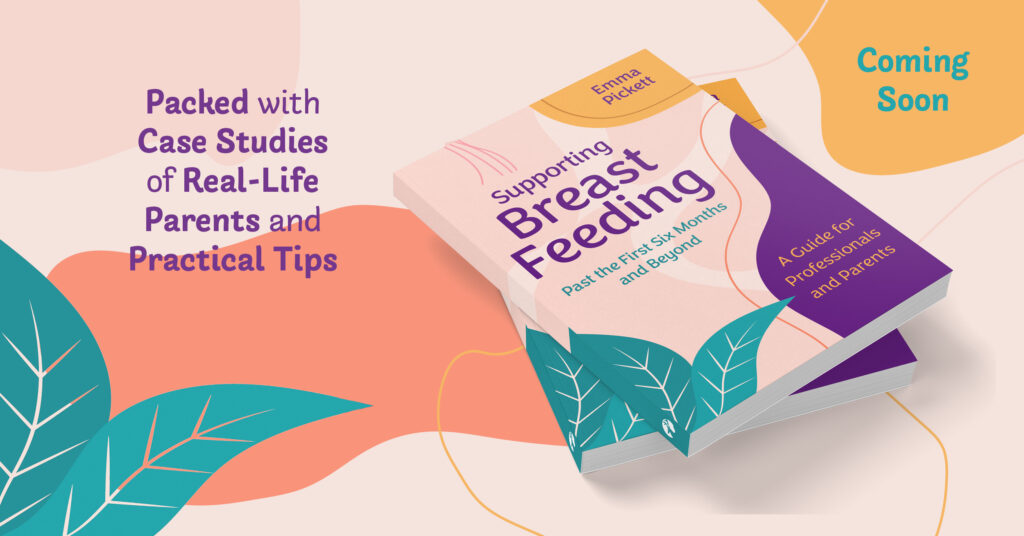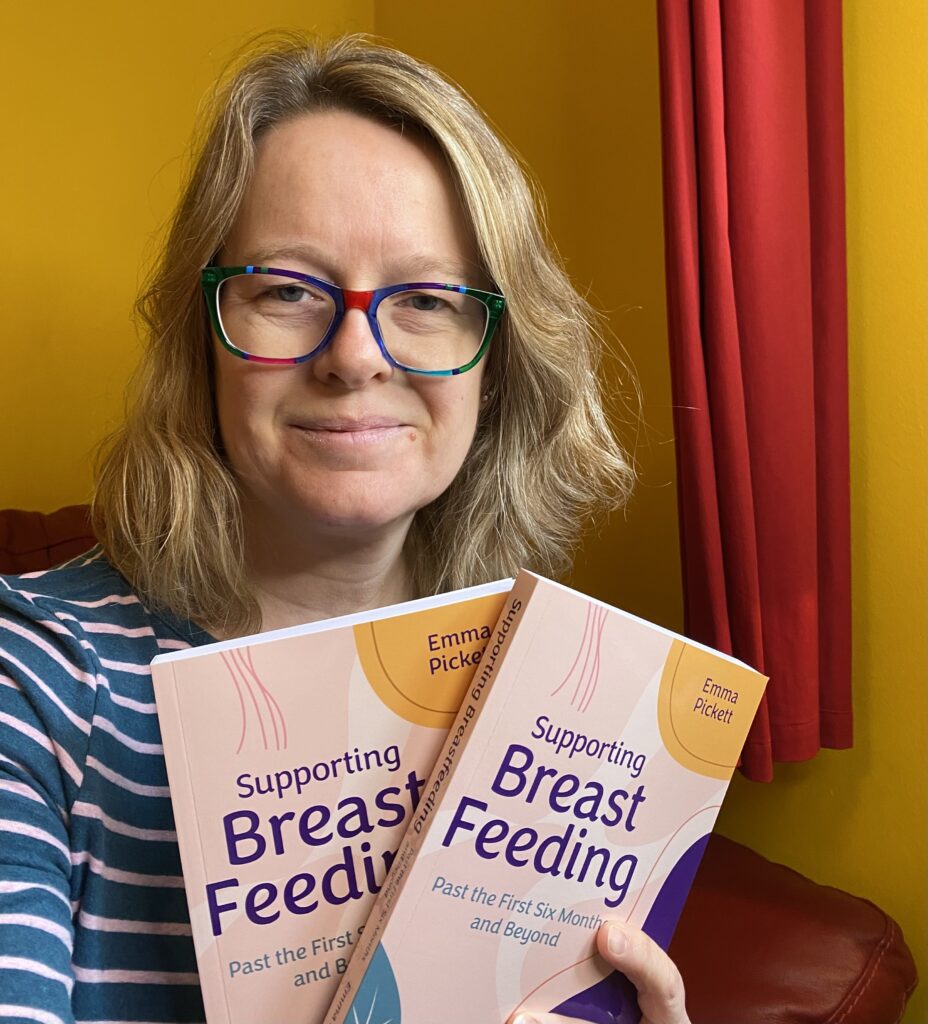
Breastfeeding Beyond Babyhood: Giving families who are continuing to breastfeed beyond six months the support they need
IBCLC and Breastfeeding counsellor, Emma Pickett discusses her motivations for writing Supporting Breastfeeding Past the First Six Months and Beyond: A Guide for Professionals and Parents. She reflects on patterns she’s observed such as the increase in continued breastfeeding during and after the pandemic, the stigma associated with breastfeeding beyond babyhood, and the ways in which her book can help professionals support breastfeeding families with confidence.
Sometimes books are written because the author feels they have no choice. There’s a gap in the market, there’s a gap on their bookshelf and it needs to be filled, so they may as well be the ones to do it!
I’ve been working to support new families to breastfeed since 2007. Most of the energy, money and education goes to supporting parents in those early days and weeks. This makes good sense. We know that when mothers don’t get to reach their breastfeeding goals, they are at increased risk of postnatal depression. We know there are health benefits – both physical and mental – for baby and parent when breastfeeding can happen. But breastfeeding isn’t always easy. Parents often need support from health professionals and lactation consultants like me.
My book aims to share the stories of families surrounding breastfeeding and provide evidence and further information.
As the months go by, not everyone finds it easy to find help when they need it. Parents continuing to feed older babies, toddlers and pre-schoolers can feel isolated. It can feel uncomfortable to turn up to a group when everyone else is holding a newborn. They may not always have the support of friends and family. Sometimes when they do reach out for help, they find that they know more than the health professionals they are speaking to. I wanted to write a book that would help health professionals feel more confident about supporting parents who continue to breastfeed. It was also important to share the voices of the parents themselves, to give a better understanding of why families continue breastfeeding and why it matters to them.
Far from being ‘weird’, families who continue to breastfeed are following the science. The World Health Organization recommends that all children are breastfed until at least 2 years old. In countries like Rwanda, India, and Sri Lanka, 75% of children are doing just that. It may be less common in countries like the UK and the USA, but I guarantee it is more common than you might imagine. Families are often just not talking about it. During and after the pandemic, I’m meeting many parents who chose to continue breastfeeding beyond babyhood when they may not otherwise have done so. Working from home facilitated it, but for some families, it went beyond that. They wanted their child to get access to antibodies after parental vaccination or benefit from the other ways breastmilk attacks viruses. It also felt important to provide their child some comfort and continuity when other parts of their life felt more uncertain.

My book aims to share the stories of families surrounding breastfeeding and provide evidence and further information. It was also important to me to make sure I shared the message that not everyone who continues is waving a pro-breastfeeding banner enthusiastically. So, we need to make sure we give them space to talk about their struggles and challenges. It’s also true that when parents want to stop breastfeeding it can be hard to find the support they need. Some parents need help to understand that choosing to bring about the end of breastfeeding is far from selfish. You are practicing self-care in a way that your child can learn from. A three-year-old is too small to develop a full understanding of empathy but they can begin to understand that you have feelings too and can be introduced to concepts like consent, body autonomy and negotiation.
Ideally, everyone should get to breastfeed for as long as they want to: whether that’s one day, one year, or not at all. I’m hoping this book goes some way to help parents get support if they choose to continue beyond babyhood.
One thing I wanted to emphasise in the book was that continuing to breastfeed doesn’t have to mean a parent loses their identity and always must put their own feelings aside. This is also true when it comes to the end of breastfeeding. Some parents think that breastfeeding is only allowed to end when their child is completely ready, and the aim is to avoid them being upset in any way. Anything less than that, and you have failed as a parent. As I say in the book:
“In truth, one of the first conversations needed may be around the fact that their nursling has the right to mourn the end of the breastfeeding relationship as much as parents have the right to their own body autonomy and the ability to choose to bring breastfeeding to a close. Certainly, there are times when we can look for distraction and attempt to avoid a sense of rejection. It’s always the ideal to naturally avoid tears and upset, but the idea that successful weaning means a toddler peacefully acquiescing and anything less than this is cruelty, is unhelpful. If a nursling is expressing anger and frustration, these can be opportunities for validation and understanding, rather than a scrabbled desperate time to switch off those emotions. Helping a child to come to terms with the loss of breastfeeding with discussion and open dialogue is a powerful parenting opportunity. Supporting a child through loss gives a valuable opportunity to explore their resilience. Far from this all being a quest to find an end to breastfeeding with the least emotional reaction possible, it is about looking for the emotions and supporting through them. We want little people to feel they can express anger and sadness at the loss of breastfeeding. We even want the big people to be able to say that they feel sad too.”
Ideally, everyone should get to breastfeed for as long as they want to: whether that’s one day, one year, or not at all. I’m hoping this book goes some way to help parents get support if they choose to continue beyond babyhood. And I hope other professionals also feel it has filled a useful gap on their shelves.
Emma’s invaluable guide, Supporting Breastfeeding Past The First Six Months and Beyond is out on 21st April and available for pre-order now.